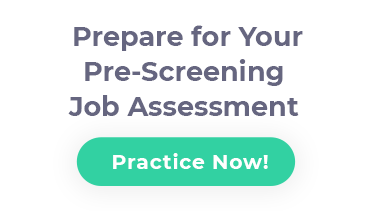CSJT Online Preparation & Free Civil Service Judgement Test Practice Questions – 2024

What Is the Civil Service Judgement Test?
The Civil Service Judgement Test, or CSJT, is an online exam that assesses a candidate’s suitability for a specific civil service position based on their behaviors and how they respond to different situations they may encounter on the job. Think of it as a situational judgment test for these specific professions.
There are six different versions or “levels” of the exam, each corresponding to certain behaviors needed for various positions. For example, Level 1 is for an Administrative Officer or Administrative Assistant, whereas Level 6 is for a Director or Director-General.
Each test consists of two sections. The first is a self-assessment personality questionnaire where test takers will self-report how they feel about different statements. The second is a behavioral assessment that evaluates behaviors based on the position you are applying for.
Behaviors Measured by the CSJT
Each test will assess some of these nine following behaviors:
- Seeing the Big Picture: In Civil Service work, employees need to be able to look at the overall significance of what they are doing and how they are impacting people and the organization.
- Making Effective Decisions: Civil servants must be able to take in information from various sources, consider the benefits and risks of particular courses of action, and determine the best possible decision.
- Communicating and Influencing: Workers must be able to clearly communicate information and sway others to see the benefits of their ideas.
- Developing Self and Others: Civil service employees must continually improve and develop themselves and their organization.
- Delivering at Pace: In civil service, it is imperative to meet deadlines without rushing and impacting the quality of the work.
- Changing and Improving: Employees must always be open to changes and improvements in themselves and the organization.
- Leadership: Civil servants take pride in their profession and use their passion to lead others and inspire them with the organization’s purpose.
- Working Together: Civil service employees must be able to effectively collaborate with others both internally at their organization and with external stakeholders.
- Managing a Quality Service: Lastly, civil servants must be able to work effectively and professionally to meet the organization’s goals while addressing customer needs.
Self-Assessment Personality Questionnaire
The first section of the CSJT is the Self-Assessment Personality Questionnaire which examines the candidate’s personality traits and values to ensure they align with the organization’s.
Test takers will receive a statement and must report how much they agree with the sentence on a scale from 1 to 7, with 1 being “Completely Disagree” and 7 being “Completely Agree.”
The questions on this exam will ask about aspirations, engagements, and motivations in the workplace.
CSJT’s Personality Test Sample Questions
Here are a few sample questions similar to what you can expect on the first part of the CSJT:
Question 1:
I prefer working alone on projects.
1 – Completely Disagree 2 3 4 5 6 7 – Completely Agree
Answer 1:
For this question, you will want to answer on the “disagree” side of the scale. Remember that one of the behaviors this exam tests is “working together,” which is a critical skill in civil service.
Question 2:
I am more of a leader than a follower.
1 – Completely Disagree 2 3 4 5 6 7 – Completely Agree
Answer 2:
You will want to answer on the “agree” side of the scale for this question. One of the behaviors they seek is leadership, so you want to show the organization you have the skills to promote their cause and take charge of your work.
Question 3:
I tend to focus on the details of a project rather than the big picture.
1 – Completely Disagree 2 3 4 5 6 7 – Completely Agree
Answer 3:
You will want to answer this question on the “disagree” side of the scale. Organizations in the civil service sector need employees who can see the overall impact of their work and help guide the organization’s direction.
Question 4:
I am always looking for ways I can improve myself and my team.
1 – Completely Disagree 2 3 4 5 6 7 – Completely Agree
Answer 4:
You should answer this question on the “agree” side of the scale. Organizations in civil service are looking for job seekers who embrace change and seek improvements.
Behavioral Assessment (SJT)
The second part of the CSJT is the Behavioral Assessment. This exam will focus on the behaviors needed in the position you are applying for.
This section will ask you to evaluate responses to different scenarios you may encounter on the job. You will receive a video or paragraph describing a work-related scenario and four possible actions or responses. You will then have to rank each answer into one of the following four categories:
- Effective: This category is for good responses that will help the situation.
- Fairly Effective: Answers in this category are practical actions that will help in some way but not as much as a solution in the “Effective” category.
- Ineffective: Poor actions that will not progress toward a solution will go into this category.
- Counterproductive: The last category is for responses that will actively worsen the situation and should not be done in response to the scenario.
One thing to keep in mind is that all responses should be ranked compared to the other answers presented. Therefore, if one response seems less effective than the others, it should probably be put in the “counterproductive” category, even if it doesn’t seem like a terrible response.
As with the first part of the exam, you’ll want to keep in mind the values of the organization you are applying for and the type of employee they seek.
CSJT’s Behavioral Sample Questions
Here are a few examples of questions you may encounter in the Behavioral Assessment section:
Question 1:
You have just started working as a school administrator, and one of the parents has called the school very upset. You are not sure how to address their concerns, and no one else is around to answer your questions. How would you rank each response in this situation?
Counterproductive Ineffective Fairly Effective Effective
- Write down the parent’s contact information and have another team member call them back.
- Tell the parent to call back later when someone else can answer their questions.
- Try your best to address their concerns and take their contact details so you can follow up with more information.
- Tell the parent you are new and do not know how to answer their questions.
Answer 1:
- This response is Fairly Effective. Eventually, it will resolve the parent’s concerns, but more could be done now.
- This response is Counterproductive. Not only would this not do anything for the issue at hand, but it could also anger the parent leading to other issues.
- This response is Effective. You should try to do as much as possible for the parent while noting that you will follow up with more information when available.
- This response is ineffective. While it does not bring more harm to the situation, it does not help it either.
Question 2:
You are working with your team on a new project and realize you won’t be able to meet the upcoming deadline. How would you rank each response in this situation?
Counterproductive Ineffective Fairly Effective Effective
- Communicate the issue with your manager as soon as you realize you will not make the deadline and offer alternatives (extending the deadline, reducing the scope, etc.) to deliver a quality product on time.
- Ignore the issue and hope for the best.
- Rally your team to work late nights to complete the project on time.
- Decide to not complete some parts of the project to finish by the deadline.
Answer 2:
- This response is Effective. Going to your manager immediately with possible solutions shows you have initiative and leadership qualities.
- This response is Ineffective. Doing nothing does not help the problem, so this answer choice should be avoided.
- This response is Fairly Effective. While it is good to collaborate with others and meet deadlines, civil servants should be careful not to rush their work and overwork themselves.
- This response is Counterproductive. This option does not show initiative and can end up hurting the organization.
How to Prepare for the CSJT?
Passing the CSJT is crucial for several civil service careers. The score you need to pass will vary on the position you are applying for and can be as high as 60%. Therefore, you want to ensure you get as high a score as possible.
The best way to prepare for and do well on the exam is to prepare using online resources such as practice tests and study guides. Online practice tests will allow you to answer similar questions with answer solutions ahead of time, so you better understand what to expect on the exam. Those who prepare for the exam are more likely to do well on the test than those who did not study.

